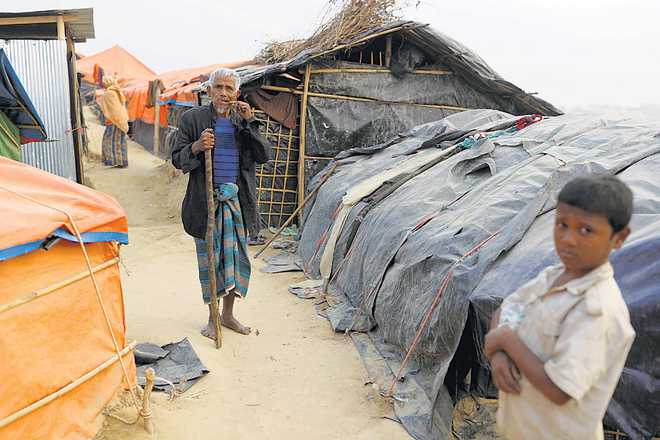
Dhaka/Yangon, January 17
Bangladesh and Myanmar agreed on Tuesday to complete within two years the return of hundreds of thousands of Rohingya Muslims who had fled an army crackdown last year in Myanmar.
The UN Refugee Agency, responding to the plan, raised a concern about forcibly repatriating over 6,50,000 Rohingya who fled to neighbouring Bangladesh after a conflict erupted in western Rakhine state in August.
Statements from both the Myanmar and Bangladesh foreign ministries said Bangladesh would set up five transit camps on its side of the border. Those camps would send Rohingyas to two reception centres in Myanmar. The repatriation process would start next Tuesday, the statements said.
Myanmar said it would build a transit camp that can house 30,000 returnees. The Bangladesh statement said “Myanmar has reiterated its commitment to stop (the) outflow of Myanmar residents to Bangladesh”.
Myanmar stressed the need for both sides to take preventive measures against possible Rohingya attacks and said it gave Dhaka a list with the names of 1,000 alleged militants.
The crisis erupted after Rohingya insurgent attacks on security posts on August 25 in Rakhine triggered a fierce military response that the United Nations denounced as ethnic cleansing. Some 650,000 people fled the violence.
The military denies ethnic cleansing, saying its security forces had mounted legitimate counter-insurgency clearance operations.
The Bangladesh statement called for repatriating orphans and “children born out of unwarranted incidence”, a reference to cases of rape resulting in pregnancy, said a Bangladesh foreign ministry official who declined to be identified.
The rape of Rohingya women by Myanmar’s security forces was widespread, according to interviews with women conducted at displacement camps by UN medics and activists. The military denies it was involved in any sexual assaults.
The meeting that concluded on Tuesday in Myanmar’s capital Naypyitaw was the first for a joint working group set up to hammer out the details of the November repatriation agreement.
Left out of the talks were the fears and concerns of the refugees themselves, “as if they are an inert mass of people who will go where and when they are told,” Phil Robertson, deputy Asia director at Human Rights Watch, told Reuters in an email.
“Where are considerations for protection of the Rohingya from Myanmar security forces who months ago were raping and killing them? How come the discussions ignore the deprivation of rights of people held in indefinite detention, which is what these so-called “temporary” accommodations may become?,” Robertson asked.